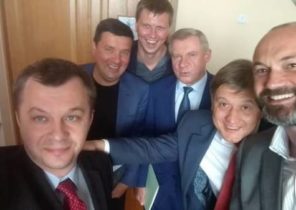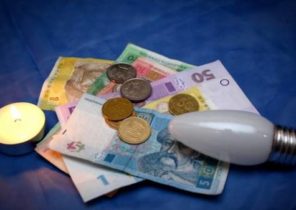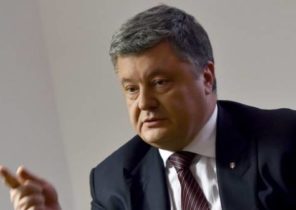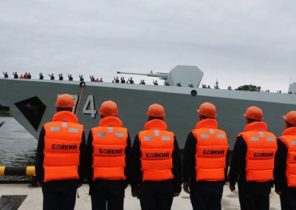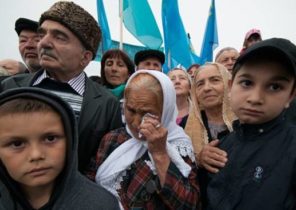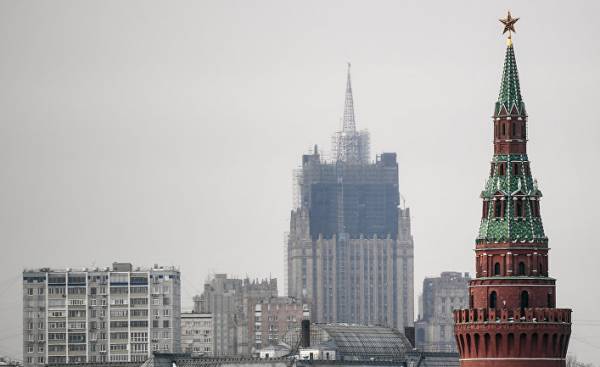
Ten years ago, Vladimir Putin angrily stated that the current post-cold war world order is a sell. Speaking at the Munich security conference in front of the Western military and diplomatic establishment, the Russian President accused the USA that they plunged the world into chaos, whipping up war hysteria, interfering in the Affairs of other countries and ignoring international law. For many at this point, Putin has become the enemy.
Now, when foreign politicians and heads of the security establishment come together in this Bavarian town, the Western order, which complained about Putin, suddenly seems fragile and weak. In defining the agenda report to the Munich security conference this year sounds like a question that abhors the West collapse after the outrage forced Britain to leave the EU and led Donald trump to power in the United States.
The Russian, pushed to the sidelines and subjected to persecutions, which, in 2007, Putin said, no longer. She was replaced by a country, the power punched his way to the world stage. She invaded Crimea, held a decisive intervention in Syria, but Western countries accuse it of meddling in their elections.
At the hearings in Congress in the appointment of a Secretary of state USA Rex Tillerson, former head of ExxonMobil, said that NATO allies are not in vain alarmed by the actions of “growing Russia”. This phrase loud echoed in Western capitals.
“Putin is pursuing a policy of assertion of Russian interests in the world at the expense of the United States,” says Eugene Rumer (Rumer Eugene), head of the Russian and Eurasian program at the Carnegie endowment in Washington. “Moscow is challenging the liberal international order which the United States is to defend and spread worldwide after the Second world war,” he adds.
The Kremlin is cautious
But despite all the talk about the strengthening of Russia, the mood in Moscow is very cautious. Of particular concern is the mess in Washington. Although the United States argued that Russia enjoys the election trump, a flurry of controversial political statements and the inability to quickly communicate with the American President upsets the Russians, who had high hopes.
Russian leaders had previously expressed cautious optimism, hoping that if trump will be able to restore relations with the United States. But now they demonstrate alertness, and in some cases suspicion and discontent, which is very similar to the mood in European capitals.
“If we wanted to, we could use the fact that they’re still not ready, says a senior leader of the Russian administration. — Perhaps we could agree that trump and Putin met without delay, and this meeting would take place. But then what?”
Difficulties arose even with the organization of negotiations between Tillerson and Russian foreign Minister Sergei Lavrov on the sidelines of the summit in Bonn, although on Thursday the meeting was held.
“It seems that a large-scale campaign in the Western media against Russia so poisoned the atmosphere that trump, who was determined to put a new start to relations with Moscow, today’s stalling,” said the Kremlin representative.
But Russian commentators say that the West greatly overestimated the power of Russia and misinterpret her motives.
“Putin’s foreign policy is not aimed at turning Russia into a superpower. He doesn’t even have the goal “to be the first guy in the village”, — says Director General supported by the government of the Russian Council on international Affairs Andrey Kortunov. — The Kremlin believes that his actions are more defensive and are a response to attacks on Russian interests”.
However, some Russian ideologues triumph, considering that it began an irreversible decline of the West, against which their country improves its status and international weight.
“The Golden age of the liberal international order came to an end,” says a conservative nationalist former MP and diplomat Natalia Narochnitskaya. She argues that many European citizens are disappointed in the EU and believe in its ability to serve the interests of the continent. “For them, Putin is the only leader who is able to raise the flag and openly, without any justification to declare that he will protect traditional values,” says Narochnitskaya.
According to her, postmodern Europe will not be able to meet and survive the challenge, which give her other civilizations. “Only together can Russia and Europe may become a party to the global triangle of power and influence — Eurasia, the US and China,” she notes.
Opposition to NATO
Russia has come a long way to develop such a cocky attitude, and it all started with Putin’s critical speech in 2007. Moscow began to take matters into their own hands in its “near abroad”, as they call the former Soviet republics, which it looks like a legitimate sphere of influence. A year and a half after the Munich speech of Putin Russia has joined the seven-day war with Georgia under the pretext of protecting Pro-Russian minority in the breakaway from the country in the region. This war began after just a few months after the NATO summit in Bucharest made a statement that Georgia and Ukraine will become members of the Alliance.
Despite the shock of this conflict, the West tried to put a new beginning to relations with Russia. But the war in Georgia was just the first shot. In 2014, Moscow annexed Crimea and fomented a separatist conflict in the East of Ukraine after as a result of street protests (according to the Kremlin, they were supported by USA) was ousted Pro-Russian President Viktor Yanukovych.
The Ukrainian conflict led to a complete collapse of relations between Moscow and the West. But Putin did not stop there. When the US and the EU tried to punish him with sanctions and isolation, he began an intervention in Syria has helped President Bashar al-Assad to regain lost during the civil war site and tore down the American and Western attempts to organize a political transition.
If you believe the representatives of the American special services, Moscow is preparing to break the main jackpot. According to estimates of the office of the Director of national intelligence, Russia intervened in the American elections, conducting a “campaign of influence”, hacking and advocacy. Less than a month after the inauguration of the trump, as from the post of national security adviser left, Michael Flynn, before joining trump in the position to discuss with the Russian Ambassador sanctions against Russia, but deny it. This resignation has generated in Washington fears that the American government is a Russian puppet.
These concerns are amplified due to the fact that in Moscow there was talk about the “big deal” which Putin may conclude with trump. In late January, state news Agency “Russia today” organized a round table, and the speakers there, analysts expressed confidence that Moscow and Washington can agree, if they keep the sphere of influence each other. Some Russian strategists believe that the settlement of the Ukrainian crisis and cooperation in the fight against global terror could become a bargaining chip in such negotiations.
According to one Russian expert on foreign policy, the administration’s position trump the question of who is to blame for the failure of the Minsk agreements on Ukraine, will help to isolate German Chancellor Angela Merkel, which is set dramatically against Russia. Alexei Chesnakov, head of the Moscow analytical Center for political conjuncture, believes that the elections in France this spring will contribute to this shift, because the candidates from the right wing to a greater extent sympathetic to Russia.
He puts forward the idea that Ukraine is increasingly reminiscent of a “failed state”, and therefore it can be considered a hotbed of terrorism. “In this sense, it becomes an object of joint struggle of the USA and Russia against international terrorism,” — said Chesnakov. In Western capitals a view is not shared.
Kortunov believes that with a different head the search for Russia’s new place in the post-Soviet world would be less dangerous, and the conflict in Ukraine could have been avoided. However, he notes that between Moscow and the West still there would be differences due to the enlargement of the EU and NATO.
Putin compared the foreign policy of Moscow and its actions in the security sphere with the Siberian bear, not wishing to leave their habitat. However, the Russian area, which Moscow considers a sphere of its national interests stretches far beyond the borders of this country.
In parallel with the invasion of Syria, Moscow has renewed ties with almost all countries in the region. Using the reduction of the presence of U.S., Russian diplomats appeared in the role of partner in dialogue with countries with mixed interests, thus creating a network that includes the NATO member Turkey, Egypt, Iran, Iraq, Israel, Jordan, Saudi Arabia and the UAE.
As a result, no single state can solve arising conflicts in the region, bypassing Moscow. France and Italy are already turning to Russia, she helped to integrate the Moscow-backed authoritarian Libyan military leader Khalifa the Haftarot in the political structure, which is supported by the UN.
A key player in Asia
Some of these steps comes from a deep fear of Russia, associated with the change of the regime by the West in countries such as Libya and Iraq. “Now they are taking active measures to prevent further mistakes of the West, half in jest said a European diplomat in Moscow. — We like it because we need them.”
At the same time, Moscow began to build relations with the leading countries in the fastest growing region, Asia in addition to strengthening relations with China, Russia is building friendly relations with Vietnam and India (here competing with the United States) and emerging populist leader of the Philippines, Duterte Rodrigo (Rodrigo Duterte). Mr Putin also uses the desire of the Japanese Prime Minister Shinzo Abe to resolve the territorial dispute between the two countries and attract this key US ally on their side.
Thanks to those steps that Russia could take a key position of a mediator in the resolution of conflicts in the South China sea or the removal of tension between China and Japan.
“Russia has its own post-Imperial trauma, like many European countries, says Fyodor Lukyanov. — The main priority of the Kremlin to resume its role as an important player in the world.”
This return brought Putin to use in Russia. Although surveys show that many people in Russia believe that the President does not cope with economic problems, and Express concern about the course of development, a large majority of the population actively supports an aggressive foreign policy.
While Russia will face restrictions because of its active desire to return to the world stage. “Despite a significant increase in the military budget in the last few years, funds were spent mainly on the recovery of resources degraded after the collapse of the Soviet Union, says Ivan Timofeev, associate Professor, MGIMO University of Moscow, where the Ministry of foreign Affairs educates future diplomats. In the long term foreign policy in the style of a superpower completely unaffordable for Russia.”
Despite all the talk about reviving the country, Russian experts understand that without strengthening the shaky economy in the long-term foreign head of Moscow will have a hard limit. “There are historical examples of States experiencing economic difficulties and seeking to assert itself at the expense of the expansionist pressure, it is possible to tell and about Russia, says Timofeev. — However in Russia there is no economic and social foundations for long-term, steady development of the state. We are not China and India, whose growth of global influence follows naturally from the increase of their economic power”.
Despite the recovery of Russian economy after two years of stagnation, the government, Central Bank and independent economists say that this growth will remain minimal.
Mr. Putin proved to be a cunning tactician to make use of opportunities around the world that require a minimum cost from Moscow. Western diplomats and Russian officials say that Russia can not cope without the help of USA and other Western countries with its commitments abroad.
“They are looking for ways… in order to assert themselves in the role of a power with which to be reckoned, — said Mr. Rumer. — However, it is their strong desire to participate in the negotiations, the presence of voting rights and veto complicates any development.”
Under such a policy even Russian strategists are in doubt about how profitable it will be Moscow’s desire to exert influence in so many places in the long term. If true, the assumption that the liberal international order is doomed to destruction, then Russia may be more likely in a situation of further chaos,” says Timofeev. However, he argues that it is the least likely scenario, as even key opponents of the old world order, such as China, copying its structures and institutions.
“If we find ourselves in the reformed and not dying international order, whose main task will be the development and not security, then Russia will be in isolation.”
The discontent remains, but to ignore Russia it is impossible
Any European or American diplomat dealing with Russia, is familiar with the discontent of Moscow towards the West.
List of open claims that NATO and the EU allowed former members of the Eastern bloc and the former Soviet republics to join them, extending thus the boundaries of both units and bringing them to Russia. Add to this claims that NATO never invited Russia into their “club”, as well as US threats against Moscow to deploy a missile defense system in Europe. Russian dissatisfaction is also expressed in the criticism of the support by many Western governments, civil society development and democracy in other countries. Further, Russia is dissatisfied with the attempts of the U.S. to regime change in Afghanistan, Iraq, Libya and several other countries as well as the intervention of Washington in some of these countries without a UN mandate. And last but not the least, Moscow is unhappy that Washington claims to be the sole superpower, leading sometimes to the neglect of the interests of other countries.
In its full form, this list was made in the speech of President Vladimir Putin at the 2007 Munich security conference. The Russian leader was the first time laid out a systematic criticism developed in the world after the collapse of the Soviet Union in the international order.
Ten years later the active actions of Russia, from Ukraine and ending with Syria, has not removed the concern of Mr. Putin. NATO has responded to Russia’s aggression in Europe to expand its military presence and patrols along the borders. There is no indication that the deployment of a missile defense system slows down.
The enlargement of the EU may lose its potential because of internal contradictions in the EU, and due to the fact that new candidates nervously glancing at Russia. The interest of Washington to support regime change can also be less.
One significant change, which may be obvious to Putin, is that now, ten years later, the West cannot ignore Russia.
